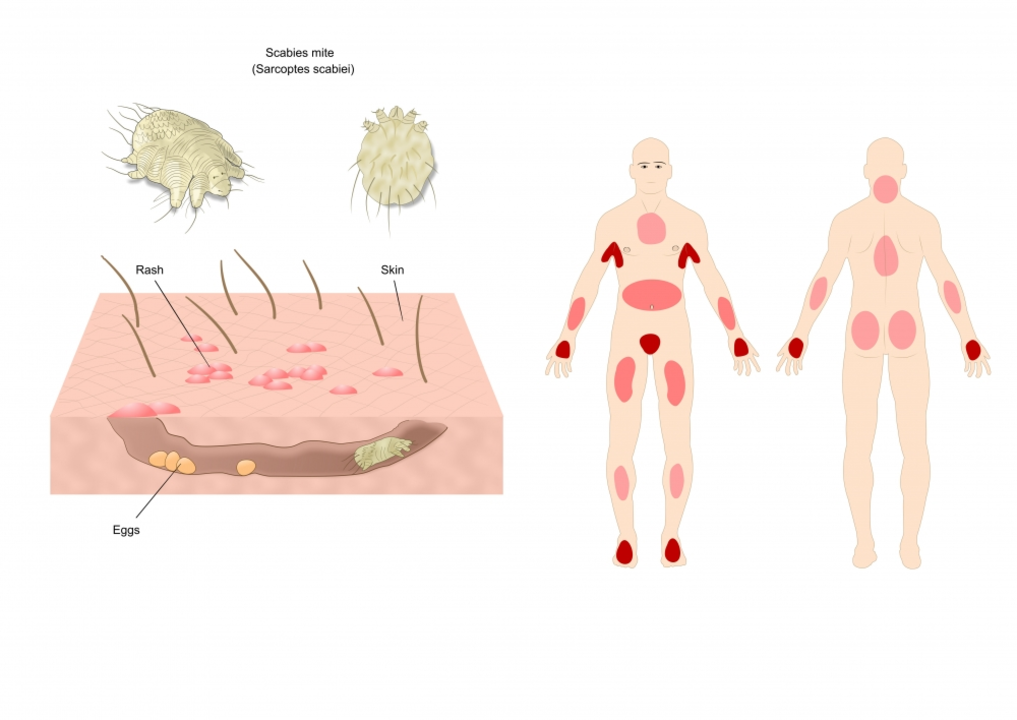Understanding Sarcoptes Scabiei and Scabies
The first step in preventing the spread of Sarcoptes scabiei in your home is to fully understand what it is and how it works. Sarcoptes scabiei, also known as the itch mite, is a microscopic parasite that causes scabies, a highly contagious skin condition characterized by intense itching and a rash. Scabies is easily transmitted through close personal contact and can quickly spread in your home if proper precautions are not taken.
It's important to know the signs and symptoms of scabies, which include intense itching, especially at night, a pimple-like rash, and burrow tracks on the skin. These symptoms occur as a result of the itch mite burrowing into the skin to lay its eggs. Once you are aware of the signs, you can take action to prevent scabies from spreading in your home.
Immediate Treatment of Infected Family Members
As soon as you suspect that someone in your household has scabies, it's crucial to seek medical treatment immediately. A healthcare professional can diagnose the condition and prescribe the appropriate treatment, usually a topical cream or lotion containing permethrin, which kills the mites and their eggs. All family members should be treated simultaneously, even if they do not show symptoms, as scabies can take 4-6 weeks to appear after initial contact with the mite.
Make sure everyone in the household follows the treatment instructions carefully, and complete the full course of treatment to ensure that all mites and eggs are eradicated. Keep in mind that itching may continue for a few weeks after treatment, even if the mites are gone, but this is a normal part of the healing process.
Thorough Cleaning of Your Home
Another crucial step in preventing the spread of Sarcoptes scabiei in your home is to thoroughly clean all living spaces. This includes washing all bedding, clothing, and personal items that may have come into contact with the infected person. Use hot water and a high heat setting on your dryer to kill any remaining mites. Vacuuming your home, especially carpets and upholstered furniture, is also necessary to remove any mites or eggs that may have fallen off the skin.
For items that cannot be washed, such as shoes and stuffed animals, seal them in a plastic bag and leave them for at least 72 hours, as the mites cannot survive without a host for more than a few days. After cleaning, make sure to dispose of vacuum bags and cleaning materials properly to prevent re-infestation.
Maintaining Personal Hygiene
Practicing good personal hygiene is essential for preventing the spread of Sarcoptes scabiei in your home. Encourage all family members to shower and change into clean clothes daily, especially after treatment has begun. Regular handwashing, especially after touching potentially contaminated surfaces, can also help reduce the risk of transmission.
Additionally, avoid sharing personal items, such as towels, bedding, and clothing, with other family members during the treatment period. This will help prevent the mites from spreading to non-infected individuals and will ensure a faster recovery for those who are infected.
Minimizing Close Contact with Infected Persons
While it is important to support infected family members during their recovery, it's also crucial to minimize close contact with them to prevent the spread of the mites. Avoid hugging, holding hands, or sharing a bed with someone who has scabies until their treatment is complete and they are no longer contagious.
It's also a good idea to inform close friends, relatives, and caregivers of the situation so they can take necessary precautions to avoid contracting the mites. Communication and cooperation are key in preventing the spread of Sarcoptes scabiei.
Monitoring for Continued Symptoms
Finally, it's important to monitor the situation closely and watch for any signs that the infection is lingering or has spread to other family members. If itching or other symptoms persist for more than 4 weeks after treatment, consult your healthcare professional for further evaluation and treatment options.
By taking these proactive steps to prevent the spread of Sarcoptes scabiei in your home, you can help ensure the health and well-being of your entire family. Remember, early detection, proper treatment, and thorough cleaning are the keys to stopping scabies from taking over your home.


krishna raut
May 16, 2023 AT 19:13And don't share towels.
Prakash pawar
May 17, 2023 AT 12:27MOLLY SURNO
May 18, 2023 AT 14:37Alex Hundert
May 19, 2023 AT 06:58Emily Kidd
May 20, 2023 AT 19:28Justin Cheah
May 21, 2023 AT 20:40caiden gilbert
May 23, 2023 AT 17:14phenter mine
May 25, 2023 AT 13:40Aditya Singh
May 25, 2023 AT 22:45Katherine Reinarz
May 27, 2023 AT 12:32John Kane
May 27, 2023 AT 16:28Callum Breden
May 27, 2023 AT 17:36Mansi Gupta
May 29, 2023 AT 04:36Erin Corcoran
May 30, 2023 AT 00:03shivam mishra
May 30, 2023 AT 14:12Alex Hundert
May 30, 2023 AT 20:29